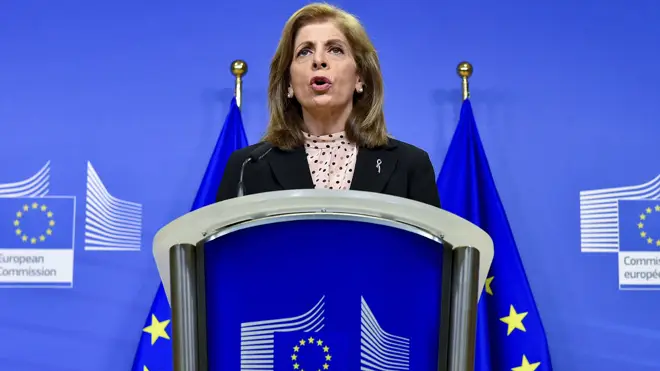
Iain Dale 7pm - 10pm
28 January 2021, 06:09 | Updated: 28 January 2021, 06:13

The EU and AstraZeneca have failed to end a bitter dispute over the rollout of the Covid-19 vaccine across the continent.
The EU is insisting that AstraZeneca provides the bloc with doses of the Covid-19 vaccine intended for use in the UK.
However the firm says the EU delayed signing contracts for several months, hence the UK getting more doses of the jab earlier.
The jab has not yet been approved for use in the EU but this is expected to come tomorrow.
We regret the continued lack of clarity on the delivery schedule and request a clear plan from AstraZeneca for the fast delivery of the quantity of vaccines that we reserved for Q1. We will work with the company to find solutions and deliver vaccines rapidly for EU citizens.
— Stella Kyriakides (@SKyriakidesEU) January 27, 2021
After talks yesterday, an AstraZeneca spokesman has said the company had "committed to even closer co-ordination to jointly chart a path for the delivery of our vaccine over the coming months".
However EU Health Commissioner Stella Kyriakides expressed regret over the "continued lack of clarity on the delivery schedule".

EU threatens to impose tight controls on the export of coronavirus vaccines
Brussels is pushing the pharmaceuticals company for more doses of its jab, after it announced it can only provide a fraction it promised for the first quarter of the year.
Boris Johnson insisted the Government is "very confident in our contracts" after European health commissioner Stella Kyriakides told the firm on Wednesday it is contractually obliged to send jabs produced in the UK to EU member states.
AstraZeneca chief executive Pascal Soriot argued supply chain "teething issues" were fixed in the UK ahead of the bloc because Britain signed a contract three months earlier.
But Ms Kyriakides said: "We reject the logic of first come first served. That may work at the neighbourhood butchers but not in contracts."
She denied the bloc would impose an export ban on vaccines leaving the EU but said the contract signed with AstraZeneca, which worked with Oxford University on its vaccine, contains two factories in the UK.
"There is no hierarchy of the factories. You are aware in the contracts there are four factories listed but it does not differentiate between the UK and Europe. \
"The UK factories are part of our advance purchase agreements and that is why they have to deliver," she added.
"We expect the doses that are in an advance purchase agreement to be delivered to the European Union."
There were concerns that the UK could face supply issues for the Belgium-manufactured Pfizer jab if the EU imposed export controls, as previously suggested.
But Ms Kyriakides said: "Let me be absolutely clear, the European Union is not imposing an export ban on vaccines or restricting the export of vaccines to third countries.
"What we have proposed as a commission is an export transparency mechanism. What it will do is bring clarity on the production capacity of manufacturers."
During a Downing Street press conference, Mr Johnson declined to get drawn into the row but said the vaccine is being produced in "ever growing quantities in the UK", adding: "That will accelerate, the production schedules will continue to improve."
He added: "All I can say is we're very confident in our supplies, we're very confident in our contracts and we're going ahead on that basis."
In an interview with Italy's La Repubblica newspaper, Mr Soriot said "we are basically two months behind where we want to be" in supplies due to manufacturing issues in Europe, citing problems in a Belgian plant.
He said there had been "teething issues" in the UK supply chain as well but that the deal with Britain was signed three months ahead of the EU's.
"So with the UK we have had an extra three months to fix all the glitches we experienced," he said.
He rejected the suggestion the firm was selling to the highest bidder "because we make no profit everywhere" under the agreement signed with Oxford University.
Prime Minister Boris Johnson said on Tuesday that he had "total confidence" in the UK's supply of jabs.